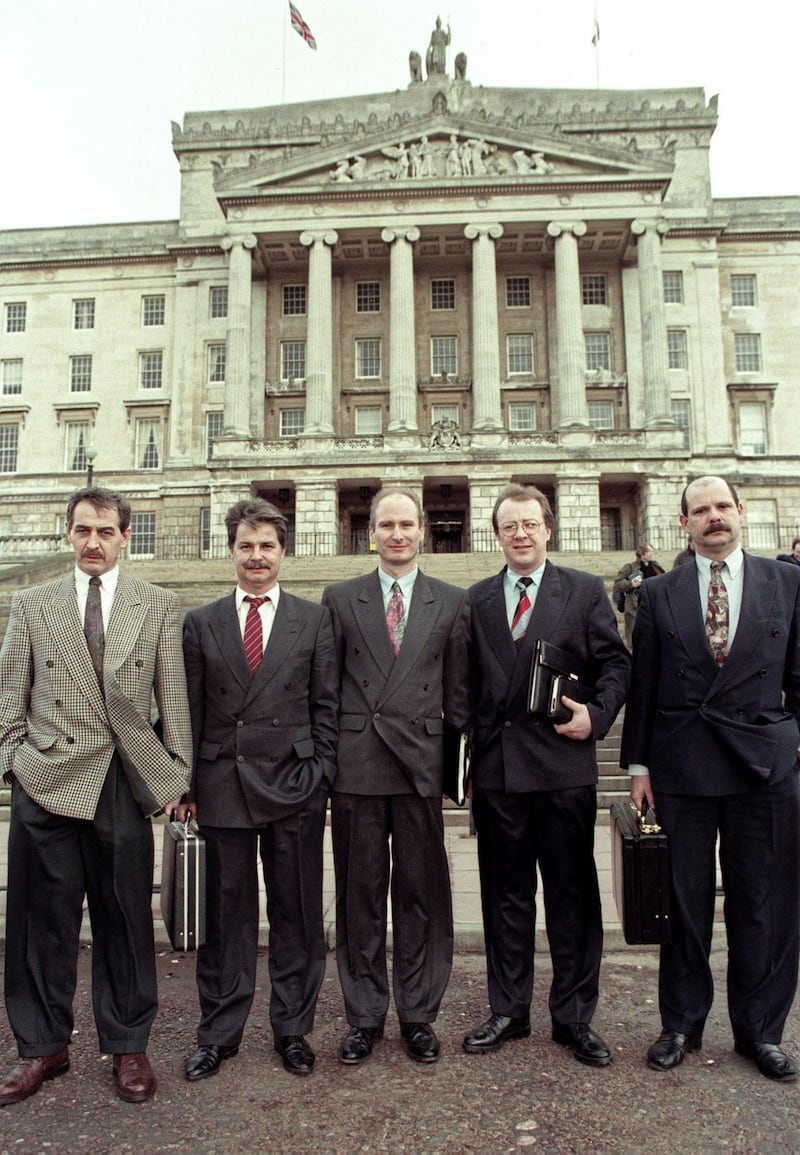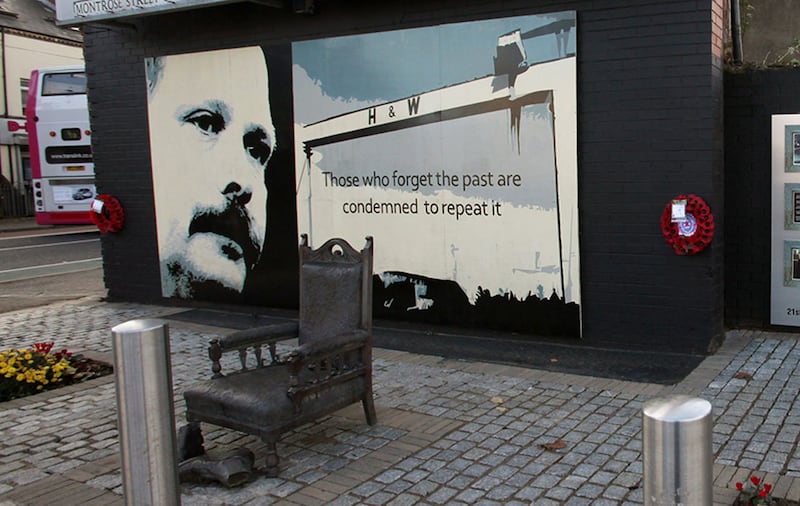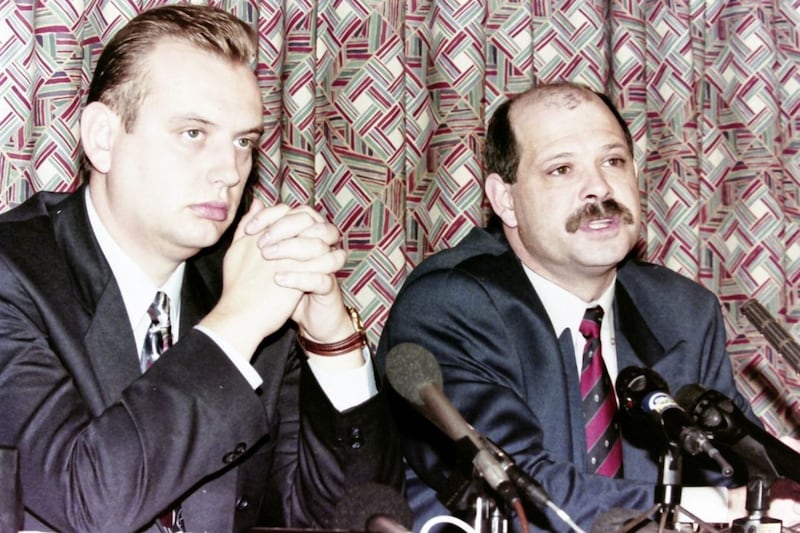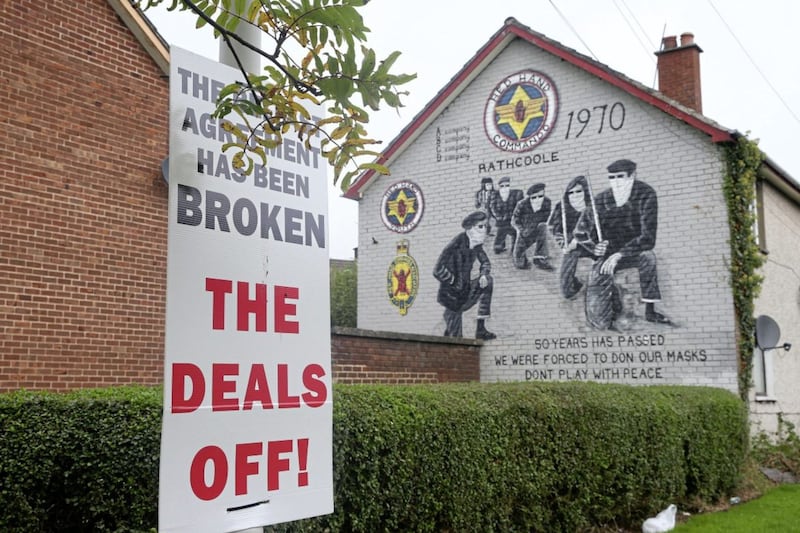"Good evening," says newsreader Kate Smith, "there were angry scenes in Lisburn Orange Hall tonight when riot police were called to a DUP rally to remove members of the fringe loyalist parties."
These dramatic clips from a UTV news bulletin on Thursday March 19 1998 can still be watched on YouTube.
Taking place a matter of weeks before the Good Friday Agreement, they encapsulate the fracturing of an uneasy alliance between what can loosely be described as evangelical unionism and elements of the predominantly urban, Protestant working class aligned to the UVF and UDA. It was a spectacular estrangement that came after decades in which the two sometimes overlapping factions had operated in concert, resisting nationalism and fighting republicanism through violence, strikes and street agitation, while at the same time rejecting 'Big House unionism' and the occasionally conciliatory approach of the Ulster Unionist Party.
To see Ian Paisley – disparagingly referred to as the 'Grand Old Duke of York' – challenged publicly by representatives and supporters of the parties 'close to the thinking of the loyalist paramilitaries' was in many ways as historically symbolic as David Trimble and John Hume on stage with Bono, or Bill Clinton's sneaky handshake with Gerry Adams on the Falls. They were all moments in the peace process that suggested things were going to be different.
The Progressive Unionist Party (PUP) and Ulster Democratic Party (UDP) were key to delivering unionist support for the Agreement, and along with their paramilitary allies, keeping a lid on dissent.
But 25 years on, the two parties that once sought to give a voice to largely under-represented communities, and in the process threaten the DUP's aim of becoming unionism's largest party, have between them only a single elected representative – PUP leader and Coleraine councillor Russell Watton. The party's UDA-aligned counterpart, the Ulster Democratic Party, dissolved amid acrimony in 2001.
In many ways the odds were always stacked against the so-called fringe loyalist parties and while there's no single reason they failed to prosper, they undoubtedly suffered a series of major setbacks. That said, there are those who argue that the PUP and UDP "were never serious political players". Professor Steve Bruce, widely regarded in the early-to-mid 1990s as the academic authority on unionism, says "they existed so that a few people could make statements and appear in public without getting nicked".
"The British and Irish governments only pretended to take them seriously so that a few moderates could be given a living, so that social funds could be channelled to loyalist communities, and so that an apparent symmetry with the IRA/Sinn Féin could be maintained," he told The Irish News.
"Once one discounts 'Ulster Independence' there was no empty ideological space for the loyalists to claim – they were just going through the motions."

Read More:David Adams: War, peace and reflection
It has been suggested elsewhere that the UDP in particular was a one issue party – getting UDA prisoners released.
David Adams, a former UDP councillor, rejects this notion but concedes the early release of prisoners was "probably a primary concern" for both loyalists and republicans.
"The UDP had an extensive manifesto at the time of the Good Friday Agreement – we championed human rights and pushed for issues around respecting cultural traditions," he says.

"Afterwards, we highlighted educational underachievement, limited employment opportunities, anti-discrimination legislation, etc so it was much more than the release of prisoners."
The most high-profile figure from the two parties was PUP leader David Ervine, a former prisoner who commanded respect across much of the political spectrum.
"David was an inspiring, honest and progressive voice," says his later interim successor John Kyle.
"He was committed to reconciliation and was a genuine alternative to the traditional entrenched parties. He represented many of those who had suffered most."
Ervine's death in 2007, at the age of 53, robbed the PUP of its figurehead, yet at the time of his passing the party's fortunes were already waning. Only Ervine had retained an assembly seat four years previously, while he and veteran Hugh Smyth were the party's only representatives at council level.

The PUP had been damaged by backlash from the larger DUP, which according to John Kyle, responded to the emerging competition by "increasing the fear of a united Ireland and showing themselves to be harder in their opposition to republicanism".
"They would stir up fear and anxiety within loyalists communities, exploiting their underlying insecurity," he says.
"There was a fightback from mainstream unionism," says Russell Watton. "They didn't want the Protestant working class to be organised because that would've threatened their position."

The former UVF prisoner, who leads his party primarily by virtue of being its sole elected rep, says he has declined no fewer than six invitations to join the DUP, a path taken by other councillors, including one-time UDP Belfast deputy mayor Frank McCoubrey.
Wilson says his "left of centre" politics and stance on social issues prevents him joining a party that's "anti-this and anti-that".
The loyalist feud of 2000 and continued criminality also dented the PUP's credibility.
"The loyalist feud was disastrous, both in the human suffering that it inflicted and the damage it did to the unionist cause in the way that it destroyed communities," says John Kyle.

The retired GP, who ended his political career with the Ulster Unionists, says the continued existence of a paramilitary wing, especially one with criminal associations, became an “indelibly negative influence on the political project”.
It was the killing of Bobby Moffett on the Shankill in 2010 that led to the resignation of Dawn Purvis, the party's then leader and only MLA. She said the PUP was "severely restricted because of its relationship with the Ulster Volunteer Force".
The party enjoyed a brief fillip in 2013 on the back of the flag protests but failed to maintain any momentum. In the years since, its profile has steadily declined. John Kyle left in 2021, then in May leader Billy Hutchinson lost his seat on Belfast City Council, months after withdrawing support for the Good Friday Agreement.
Russell Watton says working class unionist areas remain "marginalised and unrepresented".
"Electoral turn-out is low and that reflects a general disconnect between these communities and politics," he says.
The former prisoner stresses that while he was once a strong advocate of the Good Friday Agreement, he can no longer support it because he believes the Northern Ireland Protocol breaches the principle of consent.
"It wasn't unionism that kicked the principle of consent into touch, it was the pan-nationalist front," he says.
The recently-appointed PUP leader says he plans to do his best to "get things rejuvinated" but even though he mentions a couple of names, you can't help think that there's lack of new blood in the PUP. The party's website could also do with updating – it still lists Billy Hutchinson as a councillor.








